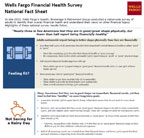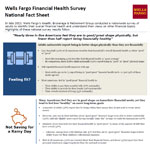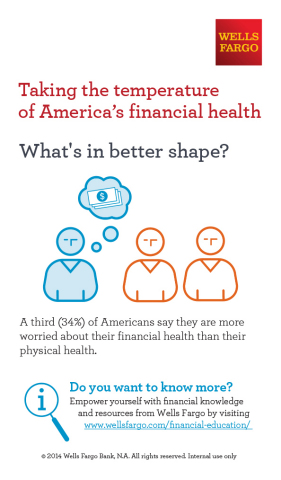SAN FRANCISCO--(BUSINESS WIRE)--A new survey from Wells Fargo (NYSE:WFC) revealed that Americans find discussing personal finances as difficult as talking about other thorny discussion topics like religion and politics. Nearly half of Americans say the most challenging topic to discuss with others is personal finances (44%), whereas death (38%), politics (35%), religion (32%), taxes (21%), and personal health (20%) rank as less difficult. These results come from Wells Fargo’s Financial Health study, a national online survey conducted by Market Probe, Inc., of 1,004 adults between the ages of 25 and 75, designed to take the pulse of Americans’ perceptions of their own financial health.
“It’s not surprising people don’t want to talk about money, investments, tax strategies, or even how much to put aside for a child’s education,” said Karen Wimbish, director of Retail Retirement at Wells Fargo. “But not spending time today to think about the future can be costly in the long-run. I think of personal finance in the same vein as my health—I wouldn’t keep concerns about my physical health private. I’d consult a doctor or talk to a friend or family member about it.”
Financial health regrets and barriers
Although people find it easier to talk about politics and religion over money, that doesn’t mean financial concerns are not top-of-mind. Two in five (39%) Americans report that money is the biggest stress in their life, 39% say they are more stressed about finances now than they were last year, and a third of Americans (33%) report losing sleep worrying about money. When asked what they would do differently if they could go back five years, more adults cite regrets about saving and spending (49%) than about shortcomings in all other areas of their life, including taking better care of their physical health, diet and fitness (42%), pursuing different personal relationships (21%), and working more to improve their career (16%).
Knowing what to do also appears to be a major barrier to a healthier financial life. In terms of getting in physical shape and exercising, respondents said the hardest part is “motivating themselves to get started” (40%) and “sticking to a plan” (36%). But for financial health and saving money, the hardest part is “knowing the best approach” (35%) and “sticking to a plan” (35%). Only 9% of respondents said motivation was the biggest barrier for improving financial health. In addition, about a third report they are more worried about their financial health than their physical health.
“When someone is physically out of shape, they typically understand that eating well and exercising more will help get them back on track,” said Wimbish. “With money, however, there’s a lack of understanding about the importance of designing a plan. Only a third of adults have some type of financial plan or a simple household budget in place, which means most Americans don’t have the roadmap needed to improve their financial health.”
According to the study, a majority of Americans feel financially healthy when addressing their basic needs, but feel less so when trying to control spending and saving for retirement and emergencies. Two thirds (67%) feel in financially good or great shape with regards to paying their monthly bills, and over half (56%) feel financially good or great in their ability to live within their means. However, only 40% feel financially good or great about their amount of discretionary spending and about their “rainy day” savings. Only a third (33%) described feeling good or great shape in their ability to retire comfortably.
Conversations about money
Seventy-one percent of adults surveyed learned the importance of saving from their own parents. Despite this, only a third (36%) of today’s parents report discussing the importance of saving money with their children on a frequent basis, with 64% indicating they talk about savings with their kids less than weekly or never.
For a quarter of married or partnered adults (25%), financial concerns have had an impact on these relationships. About a third (33%) have difficulty discussing money with their spouse or partner, and a quarter (25%) often have heated discussions with their significant other about money and household finances.
Gender differences
The study revealed some distinct differences between women and men when it comes to money matters. Half of women (50%) find it difficult talking with others about personal finances, versus 38% of men. Women are also less confident about their investment knowledge. Only 29% of women said they know where to invest in today’s market (compared to 42% of men).
Almost half of women (45%) grade their financial literacy a ‘C’ or below, while 65% of men assess their level of financial literacy as a ‘B’ or higher. Men also express greater confidence in their ability to maintain their standard of living, with 57% feeling in good or great financial shape in this area versus 49% of women.
Additional findings
The study also revealed the following saving and spending-related behaviors:
- Adults are far more likely to have their car serviced (82%) or take a vacation each year (69%) than review their finances (43%).
- Those who feel to be in poor or average financial health are twice as likely to update their Facebook profile (47%) than they are to review their finances (25%).
- Two-thirds (65%) of adults spend at least two hours watching television each day, while only one third (34%) spend at least 15 minutes thinking about their finances daily.
- One in four (25%) adults would rather pay for a personal trainer than a financial advisor.
- About a third (32%) of retirees feel more stressed financially now than they did before retiring—especially those who retired early (before age 60).
Visiting a professional is a great first step to getting fiscally fit. Wells Fargo also offers online resources for creating a financial plan and saving for retirement. For more information, please call 1-800-869-3557 or visit your local Wells Fargo store.
About the Study
These survey findings are based on an online survey conducted November 12 – November 17, 2013 among adults nationwide (N=1,004). Qualified respondents were non-students, ages 25-75, who are the primary or joint financial decision-maker in the household with household investable assets of at least $10,000. Survey results are weighted to reflect Census data for gender, age, race/ethnicity, region and household income to ensure representativeness. Assuming no sample bias, the maximum margin of error for the National sample is ± 3.1% (at the 95% confidence level).
About Market Probe
Market Probe is a full-service market research firm, headquartered in Milwaukee, WI, with offices in Evanston, IL, specializing in behavioral and opinion research among hard-to-reach populations and professional communities. For more information, visit marketprobe.com.
About Wells Fargo Wealth, Brokerage and Retirement
Wells Fargo Wealth, Brokerage and Retirement (WBR) is one of the largest wealth managers in the U.S., with $1.3 trillion under management. WBR includes Wells Fargo Advisors, the third-largest brokerage in the U.S.; Wells Fargo Private Bank, serving high-net-worth individuals and families; Wells Fargo Family Wealth, serving ultra-high-net-worth families; and Wells Fargo Retirement, which manages $231 billion in 401(k) assets for 3.5 million Americans. Wells Fargo Advisors is the trade name used by two separate registered broker-dealers: Wells Fargo Advisors, LLC and Wells Fargo Advisors Financial Network, LLC, Members SIPC, non-bank affiliates of Wells Fargo & Company .
About Wells Fargo (Twitter @WellsFargo)
Wells Fargo & Company (NYSE: WFC) is a nationwide, diversified, community-based financial services company with $1.5 trillion in assets. Founded in 1852 and headquartered in San Francisco, Wells Fargo provides banking, insurance, investments, mortgage, and consumer and commercial finance through more than 9,000 stores, 12,000 ATMs, and the Internet (wellsfargo.com), and has offices in more than 35 countries to support the bank’s customers who conduct business in the global economy. With more than 270,000 team members, Wells Fargo serves one in three households in the United States. Wells Fargo & Company was ranked No. 25 on Fortune’s 2013 rankings of America’s largest corporations. Wells Fargo’s vision is to satisfy all our customers’ financial needs and help them succeed financially. Wells Fargo perspectives are also available at blogs.wellsfargo.com.
Note: Complete survey results are available upon request.




